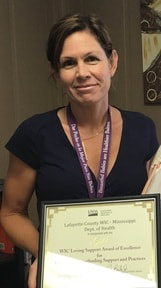CHEER CHAMPION OF THE WEEK: CHARLENE KEVIN!

Charlene Kevin, BA, CLC is a stellar Breastfeeding Peer Counselor 3 for the Mississippi Department of Health’s WIC Breastfeeding program, where she has worked for 13 years. During a recent CHAMPS site visit to Baptist Memorial Hospital-North Mississippi in Oxford, Mississippi, she provided excellent input and insight. Due to her extensive experience and skills in breastfeeding counseling, it is not surprising that Charlene was recently awarded the Breastfeeding Gold Level Loving Support Award of Excellence by the Food and Nutrition Service (FNS)! The FNS developed the Loving Support Award of Excellence to recognize and celebrate local agencies that provide exemplary breastfeeding programs and support services.
Charlene shared with CHAMPS what she loves most about her job: “My favorite part of my job is helping mothers succeed in reaching their breastfeeding goals and when I get to witness a new mother’s ‘a-ha’ of when she realizes how breastfeeding is how babies are meant to be fed.” She feels personally motivated to do this work because of the experiences she has making an impact on mothers who need an advocate or just someone who will listen to them.
Like many of our CHAMPions, Charlene’s personal experiences as a mother have informed her work. She says, “I truly believe that without the circumstances I had with my first newborn and the help of a WIC Peer Counselor to overcome my breastfeeding challenges, I would not be where I am today helping other mothers reach their breastfeeding goals. I have successfully exclusively breastfed all 5 of my C-section babies [for] a total of almost 10 years breastfeeding.”
Charlene says her aim as a WIC Breastfeeding Peer Counselor is to “help women have a positive breastfeeding experience.” She teaches her clients about the benefits of breastfeeding, addresses any breastfeeding issues, and offers support and reassurance. In addition, Charlene reaches out to her local Pregnancy Center to promote breastfeeding awareness. She says that because she lives in a relatively small community, she often gets to see the “fruit” of her labors when she encounters mothers that she has helped with breastfeeding.


